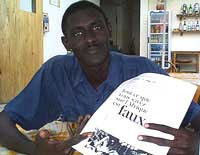
Our collaborator in Dakar
An Internet Storm
The Internet has taken Senegalese artists by storm. Even more so, now that the artistic ambiguity which surrounds this media phenomenon has dissipated after several days of "figuring out" the machine, the network, and the software.
The process of creating art works has now begun. It develops around a subject, and is further elaborated by brainstorming, selecting a common group theme, and the sketching out of a script. Next comes the production of content.
But beyond this, it is a matter of the artists commiting themselves to an interdisciplinary approach, that, while very enriching, is not without its limitations: this kind of art requires simultaneously employing numerous different artistic disciplines and creative processes. Herein lies the essence of this meeting of artists who have never had the occasion to really work with one another.
The experiments currently in progress show that they most definitely have something to create together.
The Art of Giving and Recieving
Senghor could have only hoped.
Is there a place on the Internet for Leopold S. Senghor, the ex-president of Senegal, a poet who sang the praises of negritude, and a remarkable figure in the Francophone world?
His body of work is crisscrossed with notions of cultural hybridity, universal civilization, and a famous meeting place: that of giving and receiving. Something which the contemporary concept of globalization doesn't quite capture.
With the coming of the Internet, this poet's vision seems to have become a little bit less abstract and idealized. Has it found its place in this new tool?
From this perspective, the Senegalese artists participating in the ISEA workshops are breathing new life into Senghor's thoughts.
They are at the meeting place of giving and receiving via the Internet, with art works that reflect spirituality as much as local cultural references.
Africa: A Technological Desert?
No! Africa is not a technological desert, even if the development of the Internet here has been relatively slow.
The reasons for this are numerous. The most obvious ones are related to the quality of telephone lines, the cost of communications technology, and the fact that the personal computer has barely entered the world of its potential users. Hence the various difficulties in terms of its use and the handling of software.
But there are indications that this situation won't last long, as the artists' enthusiasm for this training programme proves: initially, the number of artists expected was 12. In the end, however, 20 artists are participating in the workshops! Which has not been without consequence on the workload of the workshop leaders.
In this way, the workshops ISEA is offering Senegalese artists represents one more step bringing Africa towards the Internet.
Beyond Wishes
The workshops had barely begun when the question of follow-up was raised. In order to ensure the continuation of the projects, it is necessary to have access to computers and an Internet connection, two major obstacles in Senegal. Computer tools are still categorized along with "luxury items" and it is quite rare that an individual owns a computer.
This same scarceness is echoed in Dakar. For instance, there is but one Internet Cafe worth its name, the Metissacana. And the Internet has not been taken up in different kinds of activities (art, music, etc). That is to say, cyber culture has had a hard time being integrated into our universe.
Beyond this, is the very high cost of telephone communication, which does not favour the widespread use of the Internet. The Societe national des communications du Senegal (Sonatel) still holds a monopoly in the sector, despite the timid "privatization" of cellulaire phones. It is therefore difficult to imagine that, in the short-term, telephone rates will significantly decrease -that is, if the State, which has a large investment in this company, shows no political will to move in this direction.
It would be necessary, then, for the State to feel an obligation to act. Pressure must therefore come from everyone for whom the Internet is a tool, such as the artists who are participating in this workshop, and all their peers.